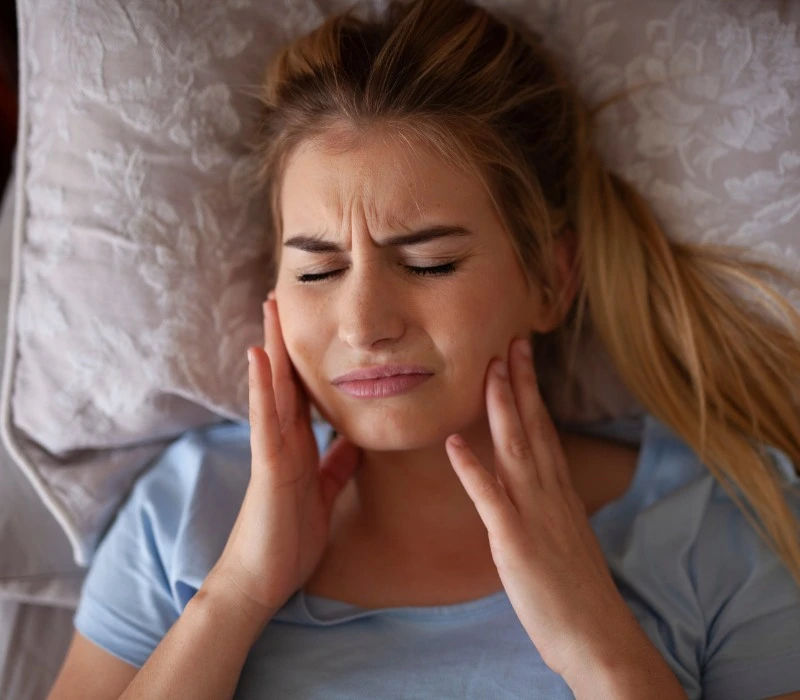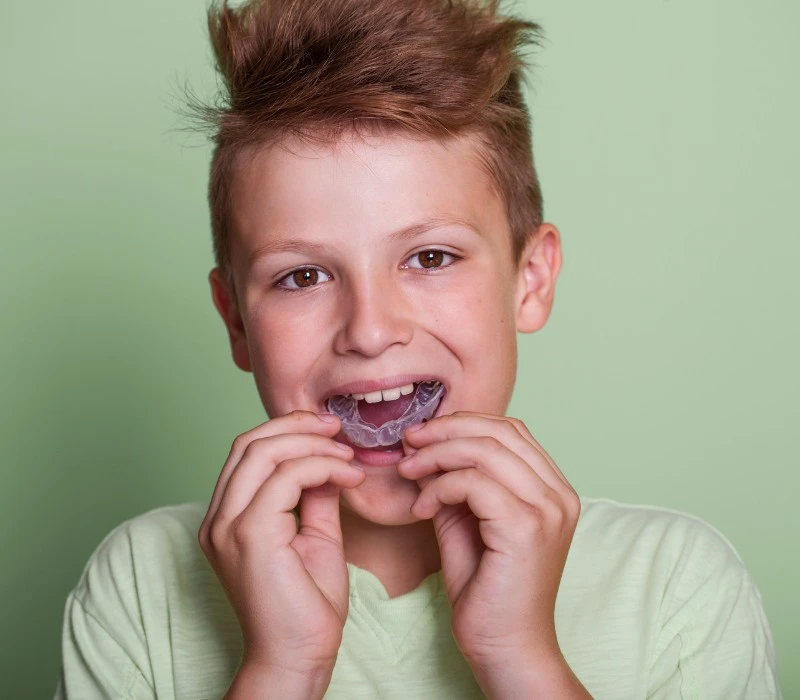Teeth grinding treatment: Bruxism botox, Dental guard, Mouth guard
Teeth Grinding (Bruxism) Treatment

Bruxism is a condition in which patients unconsciously clench their teeth. In this condition called bruxism, patients squeeze their teeth by pressing their teeth together or grind their teeth by rubbing them together during sleep or during the day without realising it. Bruxism is used in the sense of both clenching and grinding teeth. It can occur in anyone, child or adult.
The severity of bruxism cases varies according to the patient. Some patients may experience mild teeth clenching or grinding, and this may not bother them. Or patients may not be aware of the clenching problem they experience, especially while sleeping. Treatment may not be necessary for every case of clenching. However, if there are symptoms such as pain, sensitivity, or jaw and tooth structure disorders that negatively affect the quality of life, clenching treatment is required.
Cases of teeth clenching during the day are more common. However, cases occurring during sleep are more challenging to understand. It is sometimes difficult to identify cases of bruxism. For this, knowing the causes and symptoms of clenching can be a beneficial start for clenching treatment. In this article, you can find information about the causes, symptoms, and treatments of clenching.
The causes of teeth clenching
The causes of teeth clenching and grinding include psychological reasons, genetic structure, certain diseases and lifestyle.
- Psychological Reasons: Constant stress, tension, nervousness, and an anxious mood are important causes of clenching problems.
- Teeth clenching may develop while the patient is thinking and working on a subject that the patient attaches great importance to.
- Stimulation during sleep for various reasons, as well as an unconscious eating reflex, can cause clenching.
- Sleep disorders such as dementia, Parkinson's, epilepsy, hyperactivity, and sleep apnoea can trigger clenching.
- Some medications used in the treatment of diseases such as attention deficit hyperactivity disorder (ADHD) or depression may also increase the likelihood of clenching.
- There is a genetic predisposition in people whose family members have clenching problems.
What are the symptoms of tooth clenching?
Teeth grinding (clenching) can occur in two types: during wakefulness or during sleep. The symptoms of teeth clenching in the case of sleep bruxism or awake bruxism are as follows:
- Flattened, chipped and cracked teeth.
- Loose and loose teeth.
- Tooth sensitivity and toothache.
- Tension, constant fatigue and pain in the jaw muscles.
- Inability to open the jaw fully.
- Pain in the face and neck area.
- Temporal area and headache.
- Sleep disturbances.
- The sound of teeth grinding is heard by someone else.
If you experience one or more of the symptoms here, bruxism may be considered. You can also assess your kids based on these symptoms and consult a dentist if needed.
How is teeth clenching (bruxism) diagnosed?
When diagnosing clenching, dentists question the symptoms mentioned above and evaluate the dental and oral structure disorders caused by it in detail. Physical damage, such as fractures and cracks in the teeth or tenderness in the jaw muscles, is an important symptom. The patient's sleep patterns, disease history and medications are also examined.
Imaging tools such as X-rays are used to check whether there are any abnormalities in the jawbone and jaw joint.

How to treat teeth clenching in Turkey?
The treatment of teeth clenching and grinding (bruxism) is done by preparing a plan after a detailed examination by our dentists. Tooth fracture, cracking or filling loss due to clenching is treated. Depending on the need, dental fillings, laminated veneers and dental crowns can be used. If there are missing teeth, implant dental treatment can be performed. If the teeth are crowded and have alignment difficulties, braces treatment (orthodontics) may also be required.
If there are bite disorders and jaw joint problems, treatments are applied. If there are diseases that can cause teeth clenching, they are treated.
Treatment of clenching is performed in the form of a night plate and botulinum toxin application in order to prevent damage to the teeth.
Teeth clenching treatment with night plaque (night guard)
Treatment of teeth clenching with a night plate: It is realised by using an apparatus that prevents the patient from clenching his teeth and damaging his teeth during sleep. Night plates are prepared individually in the laboratory environment by taking the patient's dental impressions. In the treatment of teeth clenching and grinding (bruxism), night plates are usually attached to the upper teeth. The aligners are used under the control of the dentist and for the period recommended by the dentist.

Teeth clenching treatment with botulinum toxin
Botulinum toxin treatment is used to reduce the work of the masseter muscle, which is responsible for the clenching movement. Botulinum toxin blocks the nerves to the large chewing muscle that moves the jaw. In this way, the jaw muscle is prevented from contracting more than normal, and the problem of clenching teeth is eliminated. This substance is safely used in the treatment of clenching and grinding and does not harm functions such as chewing and speaking.
You can contact Pulpa Oral and Dental Health Polyclinic for clenching treatment in Turkey, Alanya.
Teeth grinding treatment cost in Turkey
You can Please call us for more detailed information about clenching treatment prices in Alanya and for a pre-examination appointment.
You can contact Pulpa Oral and Dental Health Polyclinic in Alanya, Antalya, Turkey for more information about bruxism treatment
Reveal Your Smile
Pulpa Oral and Dental Health Polyclinic

